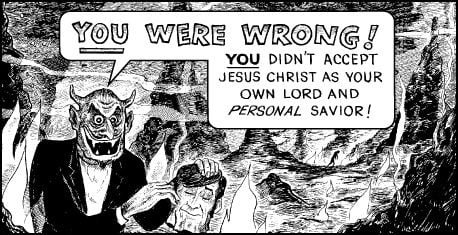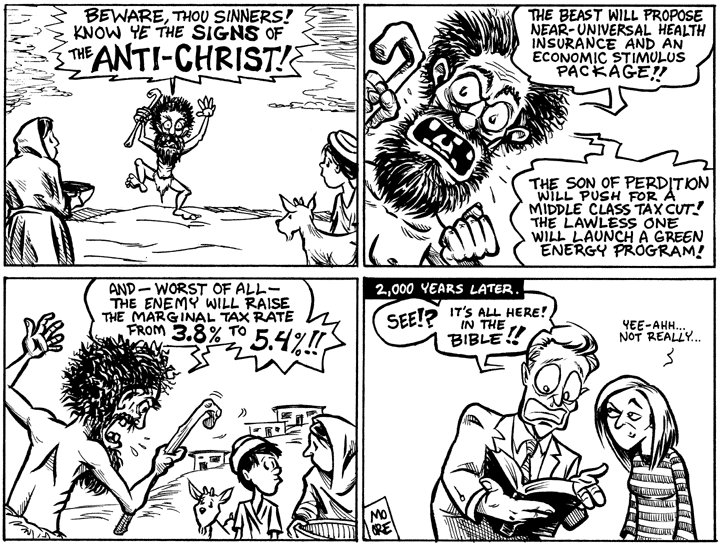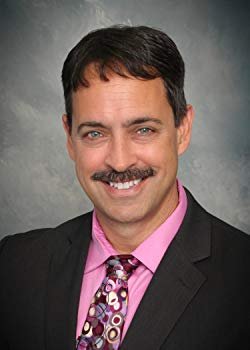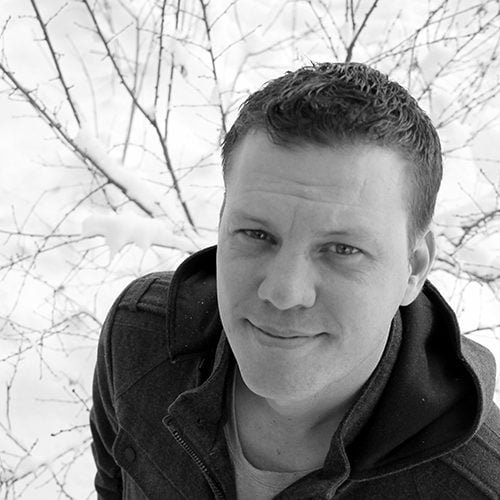
Over the years, Evangelical zealots have impressed upon me the importance of accepting Jesus as my Lord and Savior. In their minds, everything else in life pales in comparison to knowing Jesus as your personal Savior. I spent almost fifty years in churches that preached the same message, and my sermons over the course of twenty-five years in the ministry frequently reminded people that Heaven was real, Hell was hot, and death was certain; that the most important decision any of us can make is to repent of our sins and put of faith and trust in Jesus.
I am a decade removed from Christianity, and now the question I ask of Evangelicals is this: why should I accept Jesus as my Lord and Savior? I know that my former profession of faith was predicated on facts such as growing up in an Evangelical home, attending Evangelical churches during my formative years, attending an Evangelical college, and being thoroughly immersed in the Evangelical culture, both as a pastor and as a church member, for most of my adult life. If I had not grown up as I did and had all the experiences I had, would I have still embraced the Christian gospel? I don’t know. Maybe. Certainly, a small percentage of Evangelicals are adults when they get saved, so it possible for people not already conditioned by Evangelical belief and practice to accept Jesus as their Lord and Savior. However, it remains true that most Evangelical adults were either raised in Evangelicalism or transferred from mainline/liberal churches they believed no longer preached the “truth.” The current megachurch craze is fueled, not by lost people getting saved, but by transfer growth. Megachurches are notorious for pillaging the memberships of smaller, more traditional congregations. Much like the Wall Street’s corporate merger frenzy, people from smaller churches or congregations they perceive as “dead,” are joining up with large churches that meet the felt needs of everyone; that have professional musicians and staff; that have cool, hip, relevant pastors. The churches they have left behind slowly die, reaching a place financially — it is always about the money — where they can no longer keep the doors open.
What I might have become had I had other experiences (and different parents, teachers, mentors) is impossible to say, and I suspect playing such mind games is a waste a time. My life is what it is, and the fact is I did grow up in an Evangelical home, I did train for the ministry, I did marry a pastor’s daughter, and I did pastor churches for twenty-five years. That’s my story, and it is this story that has fueled my writing for the past decade.
The question I ask these days is this: what is it exactly that makes someone distinctly a Christian? Is a set of beliefs? Is it a way of life? I’ve asked these questions many times. Every Christian answers these questions differently, with every follower of Christ believing “what is right in his own eyes.” There are literally thousands of versions of Christianity, each with its own God, Jesus, orthopraxy, and orthodoxy. Every denomination, church, pastor, and individual believer has its own interpretation of the Bible and its own standard by which they judge whether someone or something is “Christian.”
The Evangelical zealots who frequent this blog believe that True Christianity® is measured by right belief. “Believe the right things and thou shalt be saved” is their gospel. However, when I read the supposed words of Jesus in the gospels — especially the Sermon on the Mount (Matthew 5-7) — I come to a different conclusion: that a Christian is a follower of Jesus; a Christian is one who follows the teachings of Jesus; a Christian is one who follows in the steps of Jesus. It seems to me that Christianity is about how one lives and not what one believes. Certainly, James made that clear when he spoke of faith without works being dead (without life).
I know a lot of atheists and agnostics who were, at one time, faithful, committed members of Evangelical churches. They were all-in kind of people, devoted to their God and their churches. Yet, for whatever reason, they no longer believe. Their stories are theirs to tell. What I do know is that these former believers, for the most part, are kind, loving, helpful people. When I look at their lives, I see what Evangelicals call the Fruit of the Spirit: love, joy, peace, longsuffering, gentleness, goodness, faith, meekness, temperance: against such there is no law. As I take inventory of my own life, I see many flaws, but all in all I am a good person. I can confidently say that most unbelievers I know are as good as Christians who spend every Sunday at a local Evangelical church. Not perfect, to be sure, but good, thoughtful, honorable people. And they are this way without promises of salvation, deliverance from Hell, or eternal life.
As I carefully examine Evangelical Christianity, the only difference I see between believers and unbelievers is what they do on Sundays. And it is for this reason that I can’t think of any reason why I should accept Jesus as my Lord and Savior.
Let the objections begin.
Bruce, if you don’t believe_______________________________ then you will go to hell when you die. So then, salvation is really about believing the right things?
Bruce, surely you don’t want to go to hell when you die. So, then, salvation is all about avoiding Hell and gaining Heaven? What kind of God has a Heaven where selfless, sacrificing people don’t make it, but live-like-hell-go-to-church-on-Sunday Baptists who believe the “right” things do.
Bruce, you are self-righteous. All your good works are as filthy rags. Unless Jesus is the one giving you the power to do good works then they are of no value at all. Really? Is that the road you really want to go down? Why is it that so many Christians don’t live any different from the unwashed, uncircumcised Philistines of the world? Evangelicals live just like the rest of us. They fudge on their taxes, watch porn, curse, lose their temper, and eat too much at the buffet just like everyone else. And yes, Evangelicals can and do love others and help people in need. Let a violent storm ravage your community, and no one cares who believes and who doesn’t. All that matters is helping others. Why should I accept Jesus as my Lord and Savior, then, if my life is, in every way, as good as that of my Evangelical neighbors? If there really is a God, surely what matters to her is how I lived my life, and not whether I checked off the right boxes on the “beliefs” quiz.
As a humanist, I believe I have the power to do good, bad, or evil. Every day, I am faced with moral and ethical choices. I make these decisions to the best of my ability, using reason, knowledge, and personal experiences to guide my way. I don’t need to check in with God, pray, read my Bible, or call a pastor to decide what I should do. My worldview is pretty simple. Don’t do things that will hurt others. This one simple statement pretty well covers most everything that I will do in life. That and, to quote my friend Ami, “don’t be an asshole.”
If Evangelicals want to prove to the world that Christianity is of value; if they want to prove that Jesus is the way, truth, and life, then they need to put their Bibles away. They need to close down their houses of worship. They need to fire their pastors and tell them to go get real jobs. And most of all they need to start living lives that reflect well on their religion. One need only to look at what is currently going on in Washington D.C. to see that there is a huge disconnect between the teaching of Christ and those who say they are his followers. That eighty-one percent of voting Evangelicals voted for Donald Trump speaks volumes. One need only to look at the Kavanaugh hearing to see that what American Evangelicals want is not ways of Jesus, but naked political power and control. As unbelievers watch this spectacle, we find ourselves saying that we see nothing in the lives of Christians that would cause us to follow after Christ. In fact, we see nothing that would cause us, at the very least, to admire the people of The Way.
The proof of any belief is how we live it. As is often quoted in Christian churches ‘’your actions speak so loud I can’t hear a word you’re saying.”
About Bruce Gerencser
Bruce Gerencser, 61, lives in rural Northwest Ohio with his wife of 40 years. He and his wife have six grown children and twelve grandchildren. Bruce pastored Evangelical churches for twenty-five years in Ohio, Texas, and Michigan. Bruce left the ministry in 2005, and in 2008 he left Christianity. Bruce is now a humanist and an atheist. For more information about Bruce, please read the About page.
Bruce is a local photography business owner, operating Defiance County Photo out of his home. If you live in Northwest Ohio and would like to hire Bruce, please email him.
Thank you for reading this post. Please share your thoughts in the comment section. If you are a first-time commenter, please read the commenting policy before wowing readers with your words. All first-time comments are moderated. If you would like to contact Bruce directly, please use the contact form to do so.
Donations are always appreciated. Donations on a monthly basis can be made through Patreon. One-time donations can be made through PayPal.


 Guest Post by Stephanie
Guest Post by Stephanie

 But there are also some things happening now that previous generations would have regarded as unthinkable.
But there are also some things happening now that previous generations would have regarded as unthinkable.


